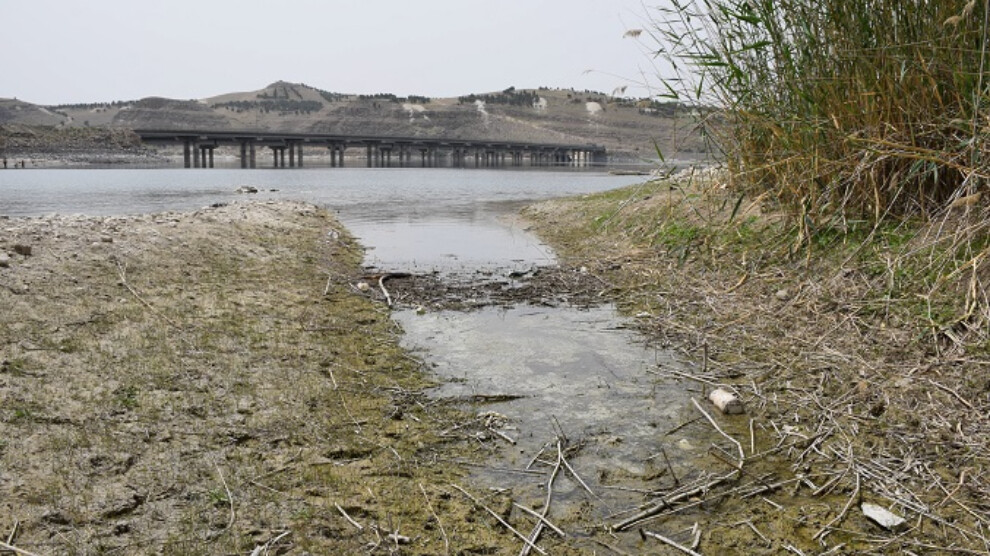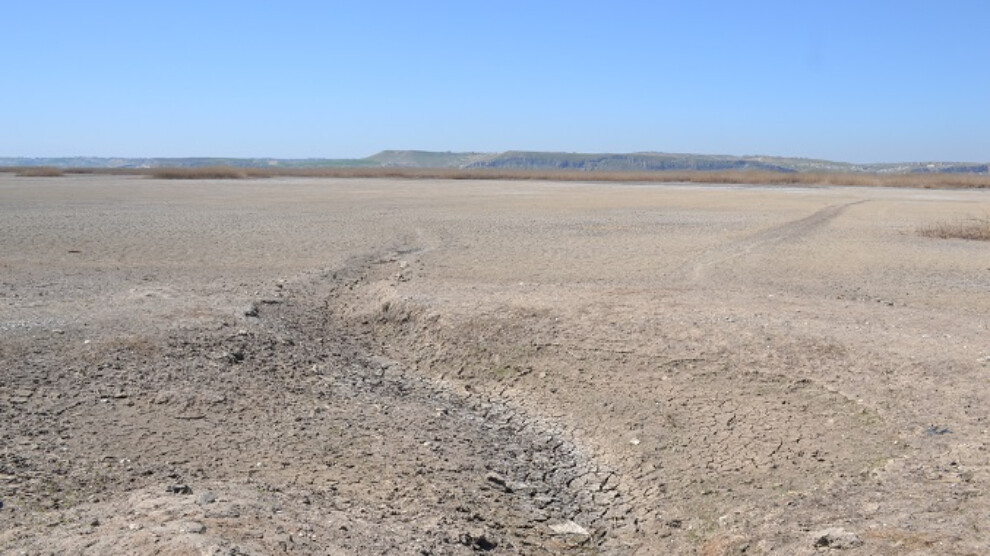The Turkish state's reduction of the water of the Euphrates River is spreading diseases.

ANF
NEWS DESK
Saturday, 10 Jun 2023
The Turkish state continues to reduce the Euphrates' water, causing the river to dry up and pollution to increase. Little water and the increasing heat cause disease to spread. Hundreds of people who fall ill due to the pollution of the river water apply to the health centers on the banks of the Euphrates every day.
Located on the Euphrates, 30 kilometers west of Kobanê, the residents of the town of Qena use the waters of the Euphrates to drink as well as water their gardens. The Qena Health Center treats 6 to 8 people who are poisoned by river water every day.
Since there is no drinking water network in the district and the water in the wells is too salty to drink, the residents have to take water from the Euphrates River and use it both for drinking and housework. However, in recent years, due to the Turkish state attacks, the amount of Euphrates water has decreased and, as a result, the water has been polluted, increasing the risks to the health of residents.
The director of the Qena Health Center, Dr. Omer Feyad Ehmed told ANHA that most patients who applied to the health center due to water pollution were vomiting and had diarrhoea. Dr. Ehmed said cases of cholera were common last year and urged residents to disinfect the river water with medicines or by boiling it thoroughly until it is clean.
Dr. Ehmed added: "Due to the lack of water and electricity in the region, the residents of the region keep their meals in hot environments. As a result, the cases of poisoning are increasing. Therefore, the food should be eaten immediately and should not be left for too long."
According to reports, the Qena Health Center treats more than 300 cases of poisoning due to pollution every month.
Eladin Kino Eto, spokesperson for the Kobanê canton Health Committee, said that 391 cases of water intoxication were documented last May from the regions around the River, mostly from Sirîn and Qena districts. He also noted that 719 cases of water intoxication were documented last April, and the situation worsened with the arrival of summer.
According to the 1987 agreement signed between Syria and Turkey, Syria's share of the Euphrates water is 500 cubic meters per second, but the Turkish state uses the river water as a weapon against the Syrian people and supplies less than 200 cubic meters of water per second.
Turkey further reduces Euphrates water in summer increasing problems in Northern and Eastern Syria
The difficulties experienced in Northern and Eastern Syria due to the Turkish state cutting off the water of the Euphrates River are getting worse with the arrival of the summer season.

ANF
NEWS DESK
Thursday, 8 Jun 2023
Temperatures are expected to be high in the region this summer. The interruption of the supply of the Euphrates River by the Turkish state will further aggravate the situation of the people of Northern and Eastern Syria. The water problem of the Euphrates River increases every year in the summer months and reaches a catastrophic level.
Since the beginning of the Syrian crisis, the Turkish state started to use the water level of the Euphrates River as a war tool by constantly violating the agreement it signed with Syria in 1987. According to this agreement, the Turkish state must release 500 cubic meters of water per second, and Syria has to share this amount with Iraq.
However, the vacuum and security problem created by the crisis in Syria enabled the Turkish state to control the waters of the Euphrates River on its own, without being accountable to anyone. As a result, the Turkish state is stealing the share of water that is the right of Syrians.
After the Rojava (Tişrîn) Dam and the Tabqa Dam were liberated from ISIS, the Turkish state began to cut off the water of the Euphrates River.
The Turkish state has been cutting off the water of the Euphrates from time to time since 2016. A large amount of water that must flow into Syria has been cut off since 2021, leaving a flow of only 200 cubic meters of water per second.
Deeper crisis in the summer
The amount of water released during the summer season is decreasing and the crisis is getting deeper. Since the natural flow of water decreases after the spring, the Turkish state steals the Syrians' share of the river's water. For this reason, the amount of water passing through Syria and then entering Iraq is further decreasing.
In the summer of 2021, the water level in Tişrîn Dam Lake reached 4 meters. In the Euphrates Dam, which contains 14 billion cubic meters of water in the 80 km long and 8 km wide reserve, it reached 6 meters.
More water is consumed in summer. While 25 cubic meters of water is used for drinking, 75 cubic meters of water evaporates without any benefit. Between 140-160 cubic meters of water is used in agricultural irrigation projects in summer.
This means that 240-260 cubic meters of water are consumed every second. However, the water in the reservoirs of the lakes is also decreasing. The water coming from Turkey does not exceed 200 cubic meters per second and does not meet the needs of the region.
The amount of water required to be given to farmers for irrigation is also decreasing, and so are the hours of electricity. On the contrary, the level of pollution in river waters is increasing, and with the increase in temperature, microbes are too. As a result, hundreds of poisonings, diarrhoea and skin diseases occur, especially in the summer.
This situation is expected to affect electricity the most, because the General Directorate of Dams gives importance to drinking water first, then comes agriculture and finally electricity. For this reason, electricity distribution hours will decrease, as there will be water shortages for farmers in the region.
Problems in agriculture
According to many agriculture committees and boards in different regions, the difficulty of obtaining the required amount of water will damage 90,000 hectares of wheat, cereals, orchards and fruit trees in Syria irrigated by river water. Since the summer of 2020, 400 thousand hectares of agricultural land have been left without water. The Dam Administration recently warned that 600 thousand hectares of agricultural land on the banks of the Euphrates River in Syria could be damaged due to the Turkish state's continuous reduction of river water.
Tişrîn Dam Administration announced on 1 March 2023 that the dam was out of service due to the water level and that cities, towns and villages in Northern and Eastern Syria were without electricity. After sufficient water was collected, the dam started working again on 8 March.
The difficulties experienced in Northern and Eastern Syria due to the Turkish state cutting off the water of the Euphrates River are getting worse with the arrival of the summer season.

ANF
NEWS DESK
Thursday, 8 Jun 2023
Temperatures are expected to be high in the region this summer. The interruption of the supply of the Euphrates River by the Turkish state will further aggravate the situation of the people of Northern and Eastern Syria. The water problem of the Euphrates River increases every year in the summer months and reaches a catastrophic level.
Since the beginning of the Syrian crisis, the Turkish state started to use the water level of the Euphrates River as a war tool by constantly violating the agreement it signed with Syria in 1987. According to this agreement, the Turkish state must release 500 cubic meters of water per second, and Syria has to share this amount with Iraq.
However, the vacuum and security problem created by the crisis in Syria enabled the Turkish state to control the waters of the Euphrates River on its own, without being accountable to anyone. As a result, the Turkish state is stealing the share of water that is the right of Syrians.
After the Rojava (Tişrîn) Dam and the Tabqa Dam were liberated from ISIS, the Turkish state began to cut off the water of the Euphrates River.
The Turkish state has been cutting off the water of the Euphrates from time to time since 2016. A large amount of water that must flow into Syria has been cut off since 2021, leaving a flow of only 200 cubic meters of water per second.
Deeper crisis in the summer
The amount of water released during the summer season is decreasing and the crisis is getting deeper. Since the natural flow of water decreases after the spring, the Turkish state steals the Syrians' share of the river's water. For this reason, the amount of water passing through Syria and then entering Iraq is further decreasing.
In the summer of 2021, the water level in Tişrîn Dam Lake reached 4 meters. In the Euphrates Dam, which contains 14 billion cubic meters of water in the 80 km long and 8 km wide reserve, it reached 6 meters.
More water is consumed in summer. While 25 cubic meters of water is used for drinking, 75 cubic meters of water evaporates without any benefit. Between 140-160 cubic meters of water is used in agricultural irrigation projects in summer.
This means that 240-260 cubic meters of water are consumed every second. However, the water in the reservoirs of the lakes is also decreasing. The water coming from Turkey does not exceed 200 cubic meters per second and does not meet the needs of the region.
The amount of water required to be given to farmers for irrigation is also decreasing, and so are the hours of electricity. On the contrary, the level of pollution in river waters is increasing, and with the increase in temperature, microbes are too. As a result, hundreds of poisonings, diarrhoea and skin diseases occur, especially in the summer.
This situation is expected to affect electricity the most, because the General Directorate of Dams gives importance to drinking water first, then comes agriculture and finally electricity. For this reason, electricity distribution hours will decrease, as there will be water shortages for farmers in the region.
Problems in agriculture
According to many agriculture committees and boards in different regions, the difficulty of obtaining the required amount of water will damage 90,000 hectares of wheat, cereals, orchards and fruit trees in Syria irrigated by river water. Since the summer of 2020, 400 thousand hectares of agricultural land have been left without water. The Dam Administration recently warned that 600 thousand hectares of agricultural land on the banks of the Euphrates River in Syria could be damaged due to the Turkish state's continuous reduction of river water.
Tişrîn Dam Administration announced on 1 March 2023 that the dam was out of service due to the water level and that cities, towns and villages in Northern and Eastern Syria were without electricity. After sufficient water was collected, the dam started working again on 8 March.
No comments:
Post a Comment